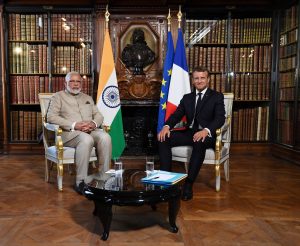The recent France-India maritime dialogue is an indicator of things of come on the maritime front in the Indo-Pacific. A host of factors are bringing France and India closer in the maritime realm like never before.
First, the understanding that countries like France and India need to pool their resources in the light of the rise of China and an increasingly uncertain American foreign policy under a Donald Trump-led Washington is driving developments.
Second, both France and India have huge interests and a historical presence in the region. France has many overseas territories in the Indo-Pacific region, with a population of more 1.6 million, and a big presence of the French armed forces.
Already the two countries hold a series of joint exercises. They are also planning to conduct joint patrols in the Indian Ocean region and sign a secure communications agreement. Meanwhile, France under President Emmanuel Macron has been strengthening its relations with India. During the visit to India by Macron in March 2018, an agreement for “Exchange and Reciprocal Protection of Classified or Protected Information” between the two countries was signed. During the same visit, the two countries also agreed on an annual defense dialogue at the ministerial level.
The recent maritime dialogue held in New Delhi was the fourth of the series and reflects the growing synergy between the two countries. At the Shangri-La dialogue earlier this year in Singapore, the French defense minister noted that “we will continue to sail more than twice a year in the South China Sea. There will be objections, there will be dubious maneuvers at sea. But we will not be intimidated into accepting any fait accompli, because what international law condemns, how could we condone?”
India also has interests in the South China Sea since the Indian state-owned oil company, ONGC, has been drilling for oil off the coast of Vietnam and New Delhi has growing economic ties with East Asian countries like Japan and South Korea. At the same time, New Delhi has been showing greater interest in the Comoros, Madagascar, Mauritius, Mayotte, Reunion, the Seychelles, etc. where France has a great influence due to historical factors. The maritime realm is also critical for India’s security since terrorists from Pakistan used a sea route to stage the horrendous Mumbai terror attacks of November 2008.
Early on in his first term in office, Indian Prime Minister Narendra Modi had outlined the concept of SAGAR — Security and Growth for All in the Region — which clearly laid down New Delhi’s priorities in the region. Clearly, there is a lot that France and India share in common in the maritime realm in the Indo-Pacific.
Rupakjyoti Borah is a Senior Research Fellow at the Japan Forum for Strategic Studies. The views expressed here are personal. Twitter @rupakj.

































